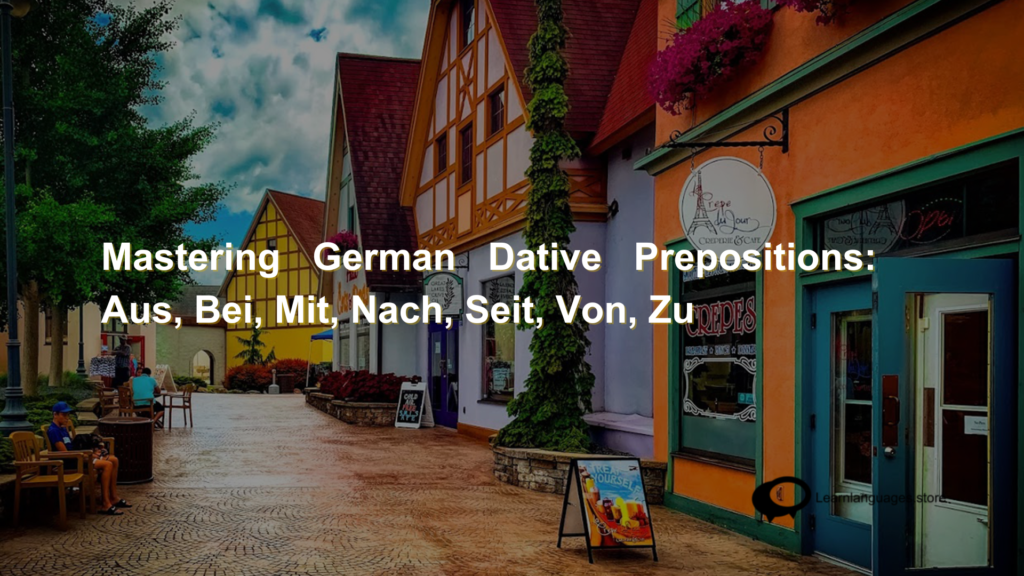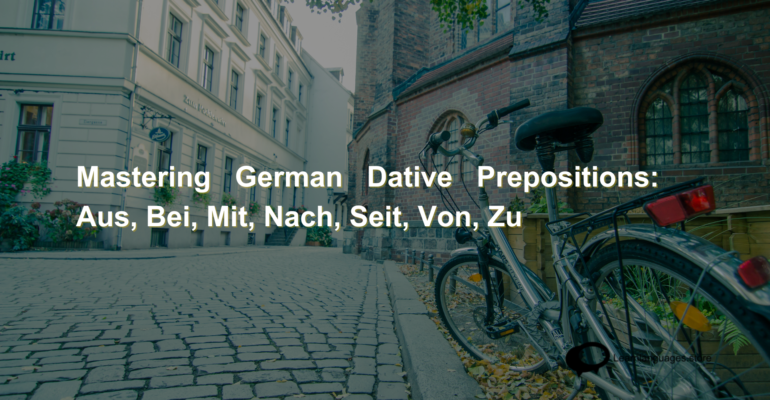Mastering Dative Prepositions in German: A Comprehensive Guide
Mastering Dative Prepositions in German: A Comprehensive Guide
Estimated reading time: 6 minutes
Welcome to the Learn Languages Store blog! Today, we’re diving into an essential aspect of German grammar: dative prepositions. Understanding and mastering these prepositions is crucial for constructing accurate and clear sentences in German. By the end of this blog, you’ll be equipped with the knowledge to use dative prepositions correctly, enhancing your fluency and comprehension of the language.

What Are Dative Prepositions?
Dative prepositions in German are specific prepositions that require the noun or pronoun following them to be in the dative case. In German, this involves using distinct articles and forms depending on the gender and number of the noun. Here are the most common dative prepositions:
- aus – from, out of
- bei – at, with
- mit – with
- nach – after, to
- seit – since, for
- von – from, of
- zu – to, at
Why Are Dative Prepositions Important?
Mastering dative prepositions is crucial for constructing clear and grammatically correct sentences. They help define the relationships between nouns and other sentence elements, making your German more precise and natural. This mastery is a significant step toward fluency!
-
Product on sale
 German B1
German B1₹32,600.00
₹42,600.00 -
Product on sale
 German A2
German A2₹24,300.00
₹32,600.00
Key Dative Prepositions with Examples
Let’s explore how to use these dative prepositions effectively, with example sentences, word-for-word translations, and pronunciation guides to assist you in learning.
1. aus (from, out of)
- Sentence: Ich komme aus Deutschland.
Translation: I come from Germany.
Pronunciation: इश कोमे आउस डॉयच-लांड - Sentence: Er trinkt aus der Flasche.
Translation: He drinks out of the bottle.
Pronunciation: एयर ट्रिंक्ट आउस डेर फ्ला-शे - Sentence: Die Blumen sind aus dem Garten.
Translation: The flowers are from the garden.
Pronunciation: दी ब्लू-में जिंट आउस डेम गार-टेन - Sentence: Sie nimmt das Buch aus der Tasche.
Translation: She takes the book out of the bag.
Pronunciation: ज़ी निम्म्ट दास बुख आउस डेर टा-शे - Sentence: Ich sehe aus dem Fenster.
Translation: I look out of the window.
Pronunciation: इश ज़े-हे आउस डेम फें-स्टर
2. bei (at, with)
- Sentence: Ich bin bei meiner Freundin.
Translation: I am at my friend’s place.
Pronunciation: इश बिन बाइ माइनर फ्रॉइंडिन - Sentence: Er arbeitet bei der Bank.
Translation: He works at the bank.
Pronunciation: एयर आर-बाइ-टेट बाइ डेर बैंक - Sentence: Wir treffen uns bei ihm.
Translation: We meet at his place.
Pronunciation: वीर ट्रे-फेन उन्स बाइ इम - Sentence: Ich wohne bei meinen Eltern.
Translation: I live with my parents.
Pronunciation: इश वो-ने बाइ माइनन एल-टर्न - Sentence: Sie bleibt bei ihrer Tante.
Translation: She stays at her aunt’s place.
Pronunciation: ज़ी ब्लाइ-ब्ट बाइ इरर टान-टे
3. mit (with)
- Sentence: Ich gehe mit meinem Freund ins Kino.
Translation: I go to the cinema with my friend.
Pronunciation: इश गे-हे मिट माइनम फ्रॉइंड इनस कीनो - Sentence: Sie fährt mit dem Bus.
Translation: She travels by bus.
Pronunciation: ज़ी फेर-ट मिट डेम बुस - Sentence: Er spricht mit seiner Lehrerin.
Translation: He speaks with his teacher.
Pronunciation: एयर श्प्रिख-ट मिट ज़ाइनर लेररिन - Sentence: Wir lernen Deutsch mit Spaß.
Translation: We learn German with fun.
Pronunciation: वीर लर्नेन डोइच मिट श्पास - Sentence: Ich spiele mit meiner Schwester.
Translation: I play with my sister.
Pronunciation: इश श्पी-ले मिट माइनर श्वेस्टर
4. nach (after, to)
- Sentence: Ich gehe nach Hause.
Translation: I go home.
Pronunciation: इश गे-हे नाख हाउ-जे - Sentence: Nach dem Essen gehen wir spazieren.
Translation: After the meal, we go for a walk.
Pronunciation: नाख डेम एसेन गे-हेन वीर श्पा-जीरन - Sentence: Er fährt nach München.
Translation: He travels to Munich.
Pronunciation: एयर फेर-ट नाख म्यून-शेन - Sentence: Sie kommt nach der Arbeit.
Translation: She comes after work.
Pronunciation: ज़ी कोम्म्ट नाख डेर आर्बाइट - Sentence: Ich reise nach Indien.
Translation: I travel to India.
Pronunciation: इश राइ-ज़े नाख इंडियन
5. seit (since, for)
- Sentence: Ich lerne Deutsch seit einem Jahr.
Translation: I have been learning German for a year.
Pronunciation: इश लर्न-ने डोइच साइट आइ-नेम यार - Sentence: Er wohnt hier seit 2010.
Translation: He has been living here since 2010.
Pronunciation: एयर वो-न्ट हीर साइट ट्वाई-टाउज़ंड-ज़ेहन - Sentence: Sie ist seit gestern krank.
Translation: She has been sick since yesterday.
Pronunciation: ज़ी इस्ट साइट गेस-टर्न क्रांक - Sentence: Seit wann bist du hier?
Translation: Since when have you been here?
Pronunciation: साइट वन बिस्ट डु हीर - Sentence: Ich arbeite seit drei Jahren in dieser Firma.
Translation: I have been working at this company for three years.
Pronunciation: इश आर-बाइ-टे साइट ड्राई यार-न इन डी-जर फ़िर्मा
6. von (from, of)
- Sentence: Ich bekomme einen Brief von meinem Freund.
Translation: I receive a letter from my friend.
Pronunciation: इश बे-को-मे आइ-नन ब्रीफ फॉन माइनम फ्रॉइंड - Sentence: Das Geschenk ist von meiner Mutter.
Translation: The gift is from my mother.
Pronunciation: डास गेशेंक इस्ट फॉन माइनर मु-टर - Sentence: Der Film handelt von einem Mann.
Translation: The film is about a man.
Pronunciation: डेर फिल्म हान-डेल्ट फॉन आइ-नेम मान - Sentence: Sie spricht von ihrer Reise.
Translation: She talks about her trip.
Pronunciation: ज़ी श्प्रिख-ट फॉन इरर राइ-जे - Sentence: Das Haus gehört von meinem Vater.
Translation: The house belongs to my father.
Pronunciation: दास हाउस गे-हॉर्ट फॉन माइनम फा-टर
7. zu (to, at)
- Sentence: Ich gehe zu meinem Freund.
Translation: I go to my friend’s place.
Pronunciation: इश गे-हे त्सू माइनम फ्रॉइंड - Sentence: Er fährt zu seiner Großmutter.
Translation: He travels to his grandmother.
Pronunciation: एयर फेर-ट त्सू ज़ाइनर ग्रॉस-मु-टर - Sentence: Sie geht zu der Schule.
Translation: She goes to the school.
Pronunciation: ज़ी गे-ट त्सू डेर शूले - Sentence: Ich komme zu dir.
Translation: I am coming to you.
Pronunciation: इश कोम-मे त्सू डियर - Sentence: Wir gehen zu einer Party.
Translation: We are going to a party.
Pronunciation: वीर गे-हेन त्सू आइ-नर पार्टी
Enhance Your German Skills!
Now that you’ve learned the dative prepositions and how to use them in sentences, it’s time to take your German to the next level! At Learn Languages Store, we offer a comprehensive A1 Level German Course for just Rs. 16,300. This course will provide you with the foundational skills needed to communicate effectively in German.
Contact Us to Learn More!
For more information about our courses, please reach out to us at:
Address:
330, 3rd Floor, Big Splash (Near Vashi Bus Depot),
Sector 17, Vashi,
Navi Mumbai, Maharashtra 400703
Phone: +91-9594113111
Email: services@learnlanguages.store
Don’t miss out on the opportunity to improve your language skills! Sign up today and embark on your journey to fluency in German!










